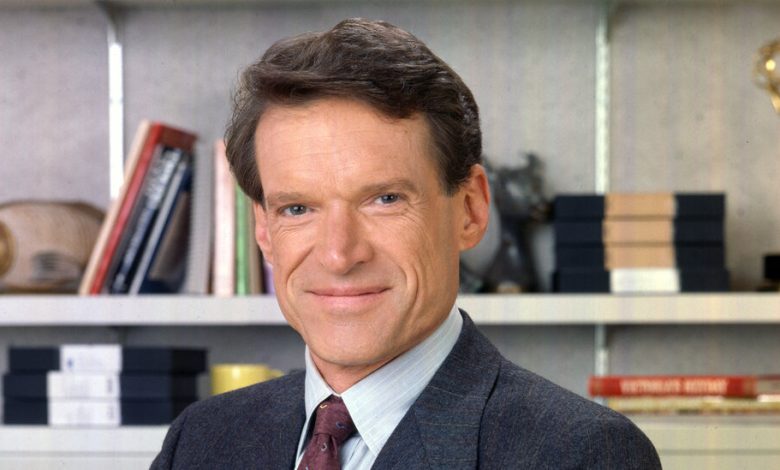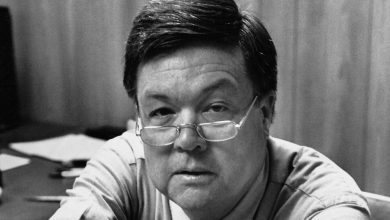Charles Kimbrough, Actor Best Known for ‘Murphy Brown,’ Dies at 86

Charles Kimbrough, an actor known for his patrician looks and stately bearing who was nominated for an Emmy Award for portraying a comically rigid news anchor on the hit sitcom “Murphy Brown,” died on Jan. 11 in Culver City, Calif. He was 86.
His son, John Kimbrough, confirmed the death.
After decades of stage work in New York, including a Tony Award-nominated performance in the original 1970 Broadway production of the Steven Sondheim musical “Company,” Mr. Kimbrough finally got his first taste of mainstream fame alongside Candice Bergen on “Murphy Brown,” the popular series set in a television newsroom that ran for 10 seasons on CBS starting in 1988. (He reprised his character for three episodes of the 2018 reboot.)
As Jim Dial, Mr. Kimbrough artfully toyed with the wooden archetype of a 1980s newsman, with his lacquered helmet of hair, Walter Cronkite-like air of seriousness and old-boy swagger (he lovingly referred to Ms. Bergen’s investigative reporter character as “Slugger”).
His rigid, pompous manner made him the ideal straight man for the show’s ever-topical plotlines. In one 1997 episode, Jim is tasked with finding marijuana for Murphy, who is seeking to ease the symptoms of her chemotherapy. “Wow, look at all of this, you must have spent a fortune,” Murphy exclaims as she holds aloft a large plastic bag of cannabis. “Damn right I did!” Jim responds. “Nickel bag, my Aunt Sally.”
It was hardly the first role that allowed him to explore fussy or priggish characters. In the 2012 Broadway revival of “Harvey,” the Pulitzer Prize-winning 1944 play about a man (played by Jim Parsons) who ends up in an sanitarium because of his friendship with a six-foot-tall imaginary rabbit, Mr. Kimbrough played the exacting psychiatrist who is obsessed with the image of his institution.
Mr. Kimbrough received strong reviews for his performance in the 1995 production of A.R. Gurney’s “Sylvia” at the Manhattan Theater Club. He played Greg, a middle-class husband struggling with midlife crisis, a wobbly career and his marriage to Kate (Blythe Danner), which grows more complicated after he brings home a new dog, Sylvia, played in very human form by Sarah Jessica Parker.
Not that Mr. Kimbrough ever sought to play stiffs. “Unfortunately, I’m really good at playing jackasses of one kind or another,” he told The Wall Street Journal in 2012. “I’ve always been slightly self-conscious as an actor, and I guess that sometimes reads as pomposity.”
“Starting when I was 30,” he continued, “I somehow gave off an impression at an audition that had them mentally put me in a three-piece suit or put an attaché case in my hand. If there was a stiff-guy part, the director would brighten up when I came in. That wasn’t the response I wanted. I was in anguish.”
It was not always so. As a younger actor, “he played a wide variety of characters who were much more dynamic,” John Kimbrough said in a phone interview. “Some of my earliest memories are of watching him in ‘Candide’” — a 1974 production of the Leonard Bernstein musical, in which Clive Barnes of The New York Times described Mr. Kimbrough’s performance as “brilliant” — “he played five different characters, and he was a dynamo, jumping in and out of costume changes.”
That was not his only kinetic performance. As Mr. Kimbrough put it in a 2002 interview with Newsday: “When I first came to New York I’d played these sweaty, physical guys who bounded all over the stage. I didn’t do a show when I wasn’t soaking wet at the end.”
Even so, he had a natural feel for playing emotionally repressed characters, in part because of his own family background.
“He came from a buttoned-up Midwestern family, and so he had grown up with people very much like the characters he played,” his son said. “They felt very deeply, but kept it hidden beneath a facade of manners and propriety. Somehow he was able to communicate that feeling to audiences, even as the guys he played were keeping it all inside.”
Charles Mayberry Kimbrough was born on May 23, 1936, in St. Paul, Minn., the older of two children of Charles and Emily (Raudenbush) Kimbrough. When he was a young child, the family moved to Highland Park, Ill., near Chicago, where his father sold commercial heating equipment.
A lover of music, particularly opera, Mr. Kimbrough majored in music and theater at Indiana University and later received a master’s degree from the Yale School of Drama.
Moving to New York, he endured the typical struggles of a young actor until he got his big break as Harry, a hard-drinking husband fighting off the lure of the bottle, in the Harold Prince production of “Company,” the celebrated Sondheim musical about a single man, his girlfriends and the couples he knows as they navigate the complexities of loneliness and love in New York City.
In a roundabout way, Mr. Kimbrough found love himself through the production, albeit three decades later. In 2002, years after his divorce in 1991 from his first wife, Mary Jane (Wilson) Kimbrough, an actress he had met at Yale, he married Beth Howland, who had played alongside him in “Company” as an anxiety-ridden bride, and who later found fame as Vera, the flighty diner waitress, on the long-running sitcom “Alice,” which debuted in 1976.
Ms. Howland died in 2016. In addition to his son, Mr. Kimbrough is survived by a sister, Linda Kimbrough, and a stepdaughter, Holly Howland.
Throughout the 1970s and ’80s, Mr. Kimbrough continued to work steadily, appearing on television shows like “Kojak” and in films like “The Seduction of Joe Tynan” (1979), with Alan Alda, while also paying the bills as a wholesome American in television spots for Imperial margarine and Chef Boyardee spaghetti and meatballs.
But it was only with “Murphy Brown,” his son said, that he found the degree of fame where fans recognized him on the street. And his success allowed him to make peace with being typecast as stodgy.
He came to realize that “stuffiness is not dullness,” Mr. Kimbrough told Newsday. “And that gave me a new lease on life.”




